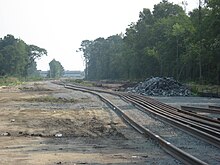Global TransPark
The GTP is part of an economic development initiative in eastern North Carolina intended to spur transition in the region from an agricultural base to one of skilled labor and industrial manufacturing.
Around 1990, academic and member of the North Carolina Economic Future Study Commission John D. Kasarda proposed the creation of a site which combined air cargo transport infrastructure and manufacturing facilities.
[2] Civic and political leaders in the urbanized Piedmont lobbied for the project to be located in their region of the state, arguing that it could benefit from the area's strong economy and, if it failed, the associated airstrip could be quickly repurposed to serve other needs.
Inspired by the Research Triangle Park to the west, GTP's growth has been similarly slow, although proponents maintain that in time the concept will prove successful.
Designed to attract industry and bring increased economic opportunities to the citizens of Eastern North Carolina and beyond, the GTP features more than 2,400 acres (9.7 km2) available for shovel ready sites.
[7] Supporters of the Global TransPark point to recent success, such as the decision by Spirit AeroSystems of Wichita, Kansas, to locate a manufacturing plant there that will eventually employ more than 1,000 people.
The Golden LEAF Foundation, which oversees North Carolina's share of tobacco-settlement money, also approved spending $100 million for Spirit's new building 500,000 square-foot facility.
The rail spur will connect Spirit's manufacturing facilities, as well as other sites within the Global TransPark, to the North Carolina Railroad's east-west line that runs through the center of Kinston to the Port of Morehead City 75 miles east of the GTP.
[12] Other companies to locate facilities at the Global TransPark in recent years include Mountain Air Cargo, Henley Aviation, Commerce Overseas Corp., Longistics, MJE Telestructure, Delta Private Jets, DB Schenker and Spatial Integrated Systems.


